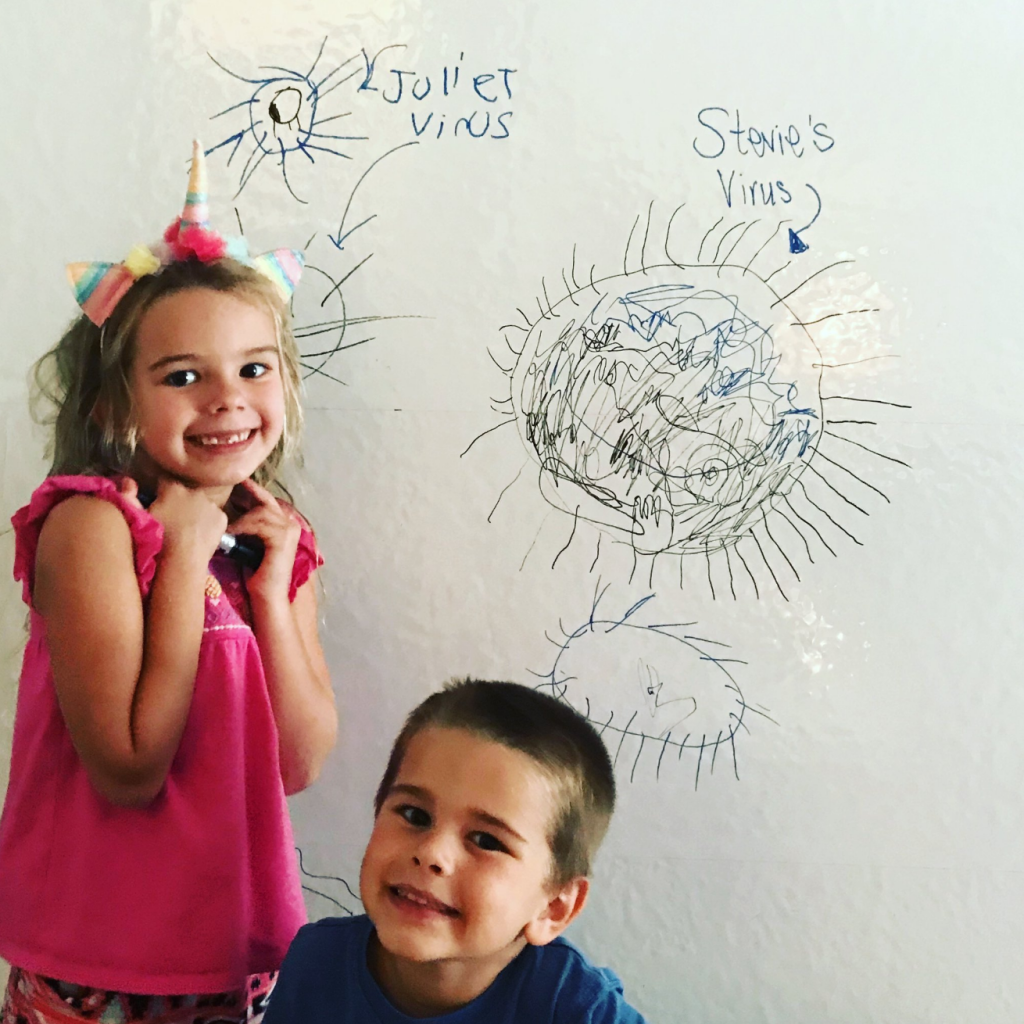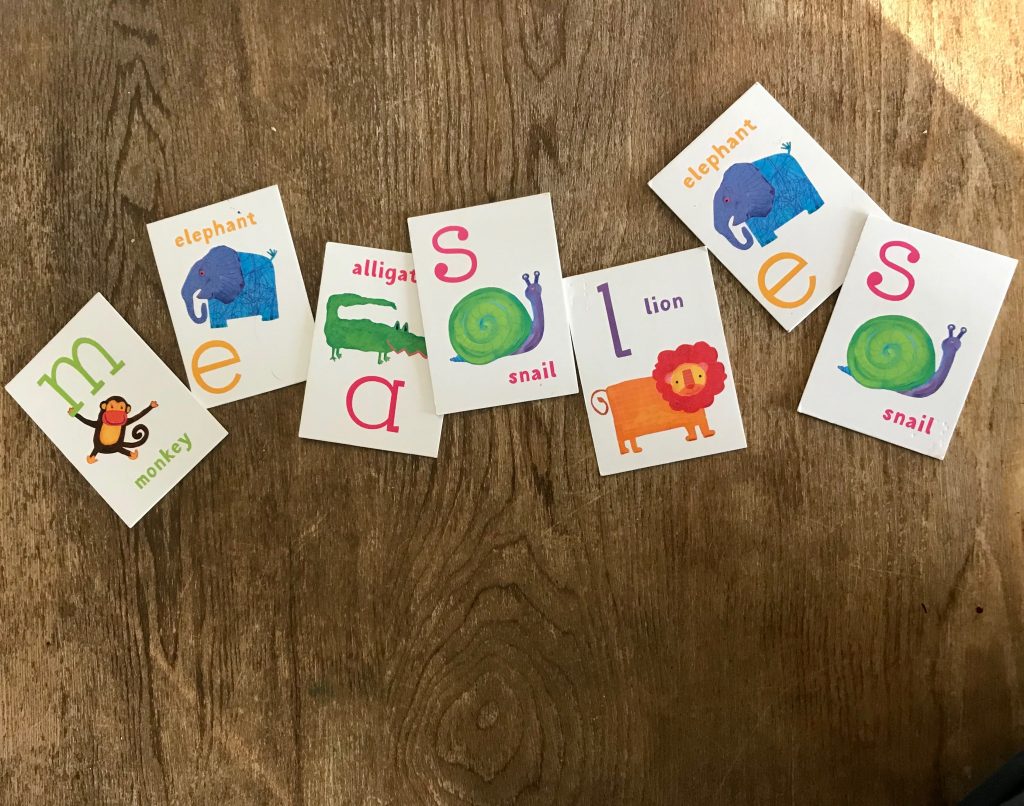What can you do to start this process of scaring the scariness out of vaccines? I have some ideas.

First, and foremost, never assume it’s too early to start talking. I have been talking to my daughter about getting vaccines from the very first shot (yep, on day one). I know she didn’t understand, but I knew one day she would, and you never know which day that day will be. In my experience, the talking calms us both long before we walk into the doctor’s office and long after we leave.
Once you’ve started talking, put yourself at ease by getting educated. Know your stuff; as I said, education reduces fear, and your lowered stress level will help lower your child’s stress level.
Speaking of stress, both of you need to find a way to be calm. My kids love squeezing little squishy animals. We also love doing yoga, practicing calming breaths, and watching snow globes. The doctor’s visits don’t have to be dreaded days, try to keep them low stress for everyone; that includes you. They most definitely pick up on your cues.
Soon your children will be old enough to understand basic concepts, so give them those concepts. Be honest. For example, you may want to say: “yes, shots hurt a little bit. But, they won’t hurt for very long after. And people used to get very sick and sometimes die from horrible diseases, but now we have vaccines to keep us from getting all of the horrible diseases. You’re so smart to get your vaccines and stay healthy!”
Show your children what the diseases the vaccines prevent look like and what they can do. As your child grows you can dive deeper into this, but the point is to get them to understand that the disease is much worse than getting than the vaccine.

Be completely honest with your child. If the check-up is coming up and you know your child will be getting shots. Say so. There should not be any surprises when it comes to getting vaccines. Telling your child you’re off to the store and then showing up at the doctor for shots is not the way to rid needle anxiety. If you’re honest, even if they’re scared about it, at least they will know what to expect.
After letting your child know the doctor visit is coming, make sure you have the time to sit down and talk about what will be happening at the appointment. There is nothing worse than being kept in the dark about something that can be very scary for a young child.
Rewards are fine and good! If your child has something nice to look forward to such as ice cream or the playground, then the shots might not seem so bad.
Kind words following the appointment will help set up for the next appointment. You could say something like, “Aren’t you so happy that you got your vaccines so now you won’t get very sick with the flu? A virus that can make you throw up and even put you in the hospital. Yuck! You’re so smart to get that vaccine!”
Lastly, keep the conversation going. Answer all of your little ones’ questions, and if you don’t know the answers, be honest. Say: “I don’t know the answer to that question, but I am going to find out the answer for you.”
Then, come ask me. 🙂
For More:
- Some great points from pediatrician and blogger at www.doctorjsmith.wordpress.com.
- Great 2 minute video from Dr. Christine Chambers at The Center for Pediatric Pain Research (http://www.pediatric-pain.ca)

“It’s never wrong to praise their bravery” … yes it is, because being praised for bravery implies that they faced or will be facing a SCARY SITUATION. And that means vaccines are SCARY!
Praise them for cooperating, but not bravery. The desired behavior may be the same, but the meaning is different.
The critical point is that children take their cues from their parents about what is supposed to be scary. If the parent is calm and matter of fact, the child will be calm and maybe curious.
DO NOT SAY “THIS WON’T HURT”!!!! They can spot the lie and they will be 100% certain that it’s agonizing. They are suspicious creatures. Don’t belabor the point of how good vaccines are, because if you are spending that much time trying to convince them that it’s OK, it must be worse than broccoli and kale. And the thing that lives in the closet.
I took blood from children – a LOT of children – and the ones whose parents tried the hardest to convince them that it was not scary and wouldn’t hurt at all were the hardest to work with. And aiming for a vein is a lot harder than aiming for an arm.
I would tell the toddlers it’s not as bad as being lunch for a bear, probably not even as bad as falling off a bicycle, and quickly work my way down to asking “have you ever poked yourself with a sewing needle? It’s not even that bad” … get a giggle, and explain that the blood would grow back faster than fingernails and they were almost always calm.
I gave permission to cry and say ouch if they wanted to do it, as long as they held still, they usually laughed instead.
Older children got a more detailed explanation if they asked for it – and some of them were EXTREMELY interested, especially the ones that didn’t realize what the blood really does and how much the lab could tell from it.
There are some age-appropriate books and pamphlets about vaccinations and the immune system. Most small children understand the concept of “wanted posters” and “lessons” so telling them that the vaccine is showing their body what the disease looks like teaches it how to get rid of it QUICK if it shows up will satisfy them.
I just download the coloring book. Very cute! Great idea!
There is also a downloadable coloring book all about flu available for free on http://nfid.org/coloring-book which can help start the conversation in a fun way.
What an amazing mom! A perfect example of how you can turn something scary into something positive. Keep the convo going with her! Great!!
A few months ago, my six-year-old daughter had a checkup. I didn’t know if she was going to need any vaccinations or not. I told her our immune system is like an army of soldiers that fights against the bad germs in our bodies, and that shots are how they train and practice and get ready for those enemies. She was able to understand that analogy pretty well. And I had no idea this coloring book existed! It was just something I came up with on the fly.